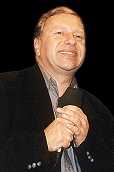 |
Vol 1, No 16
11 October 1999 |
|
|
I Made a Film about Weakness Jerzy Stuhr's Tydzien z zycia mezczyzny Lukasz Maciejewski Jerzy Stuhr rose to fame in Poland in the 1970s as an actor in the theatre. As his reputation expanded he diversified into film acting, most memorably in the films of Krzysztof Kieslowski, and theatre direction, notably the Ludowy Teatr in Krakow. His debut as a film director came in 1995, with the film Spis cudzoloznic (List of Adulteresses, 1995) and his second film, Historie milosne (Love Stories, 1997), became an international success. Tydzien z zycia mezczyzny (A Week in the Life of a Man, 1999), his third feature, was premiered at the Years of Film festival in Kazimierz Dolny (Poland), at which he spoke to the press. Highlights of his thoughts on the making of his latest film are reprinted here. I made a film about weakness. I wanted to show a man who in accusing others cannot deal with these accusations in his own personal life. My hero is professionally a very strong and powerful individual - a lawyer, who in the courtroom is unequalled. In his private life he commits the same mistakes, even the same transgressions, as those he prosecutes in court. Even ten years ago, I would not have been ready to extract this topic from myself. It is after all not easy to talk publicly about human weakness. The decision to undertake this kind of challenge was unusually difficult. Tydzien z zycia mezczyzny is a personal film, yet this does not mean that it is a film about either myself or someone close to me. Years of personal observation, working with students, appearing in theatrical productions, in films and on television are reflected in the characters of the screenplay. In the film, I play a prosecutor, for which I employ very modest acting devices - almost in an organic, documentary manner. This was the deal, although at times I thought that I should act more forcefully and expressively. This kind of expression, however, would clash with realism. A prosecutor in a courtroom cannot allow himself thunderous tirades: he must make the case most forcefully, as topically as possible. A prosecutor must rise above emotions. In the case of Tydzien z zycia mezczyzny, as well as in my earlier movies, I have often met with the opinion that my films form a continuum with the creations of Krzysztof Kieslowski. I distance myself from this legacy. I do not hide or deny that in many aspects I am similar to Kieslowski. In a similar way to him, I pay great attention to dialogue and to the way of guiding actors through the film. However, the way of "getting there" differentiates us. Krzysztof Kieslowski measures himself with metaphysics. And did this superbly. I want to first of all take a closer look at man and his role in everyday life. Kieslowski raised life to a completely different dimension - I leave it where it is. My belief in God is in the Franciscan spirit. I am happy with what I have, what life has given me and what is still to come. I do not fight fate, I patiently wait for what will come. In the end, Historie milosne [click here for a Kinoeye review] received several dozen different awards and distinctions. I take all of these as a confirmation of what I do. The most painful moment one faces while working on a specific project is that of uncertainty. The uncertainty that you will not be ridiculed, that this story is capable of actually interesting anybody, touching them, whether it will find a concrete, sensitive and receptive audience. Every award renews the faith in the sense of undertaking this work, of this colossal effort. With Tydzien z zycia mezczyzny, I worked with the same team as I used in my earlier movies. Together we have learnt certain rules of the game, which also came in to play during the making of Spis cudzoloznic and Historie milosne. They know perfectly well what I can stand and how I work. They are always wonderfully quiet and calm. It's fantastic. In the character I play, I would like people to see that I play a man who is weak and prone to mistakes, rather than one who is beaten. Defeatism, in my opinion, is an option with regard to this hero. He knows when and why he makes mistakes and he tries to correct them but usually it is rather too late for that. The last line of the film, in which an overall optimistic tone is sounded, is not defeatist. It is sincere and true, but simultaneously it does not have a singular meaning. The goal of the work is not to moralise, but rather to ask questions - important questions. Transcribed by Lukasz Maciejewski and originally published in Polish in the September 1999 edition of Cinema
Click here for the accompanying review of Stuhr's Tydzien z zycia mezczyzny
|
|
![]()
Copyright (c) 1999 - Central Europe Review and Internet servis, a.s.
All Rights
Reserved
